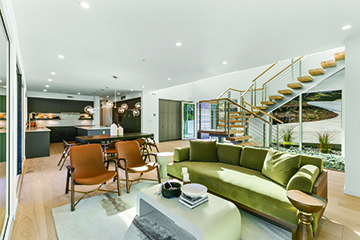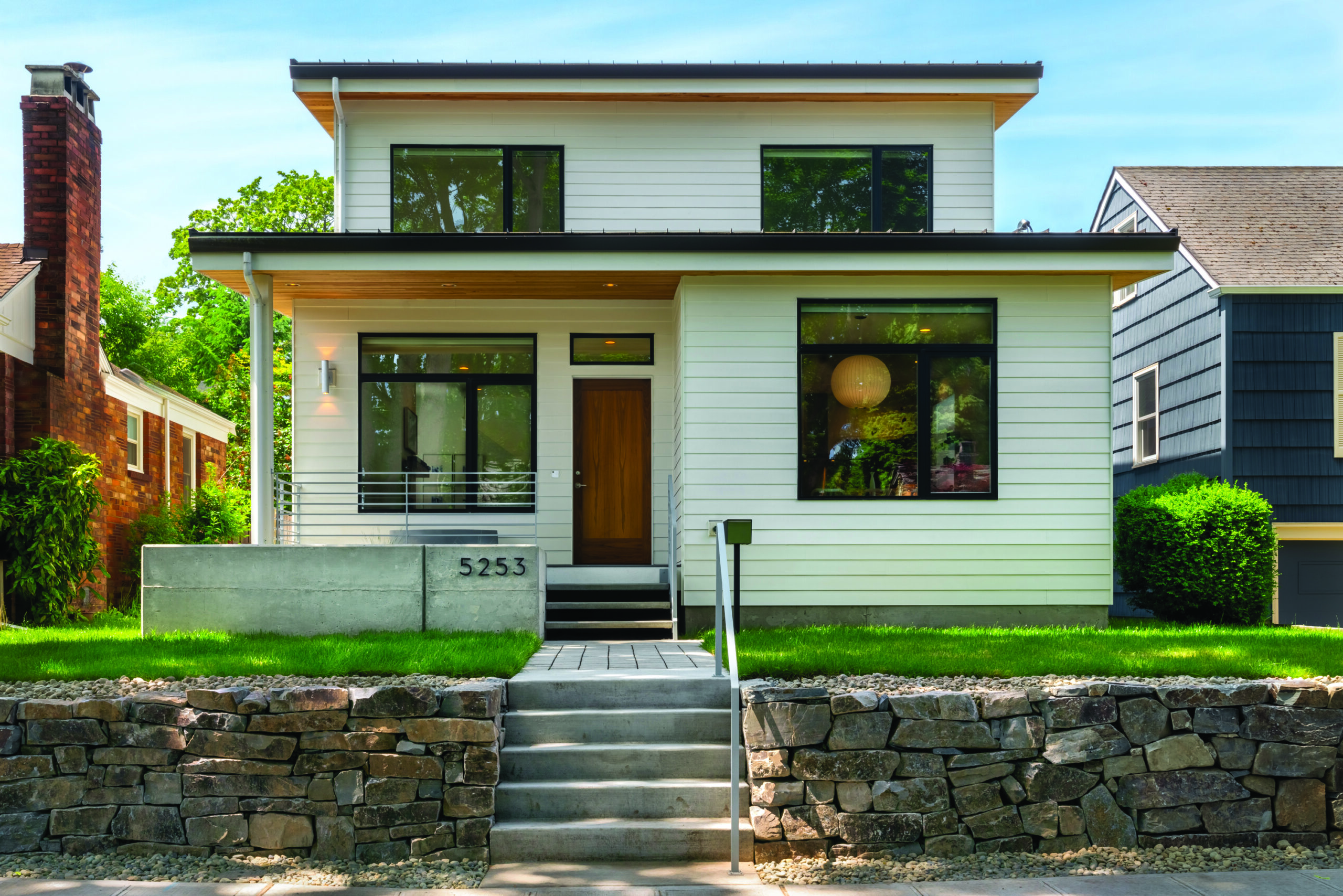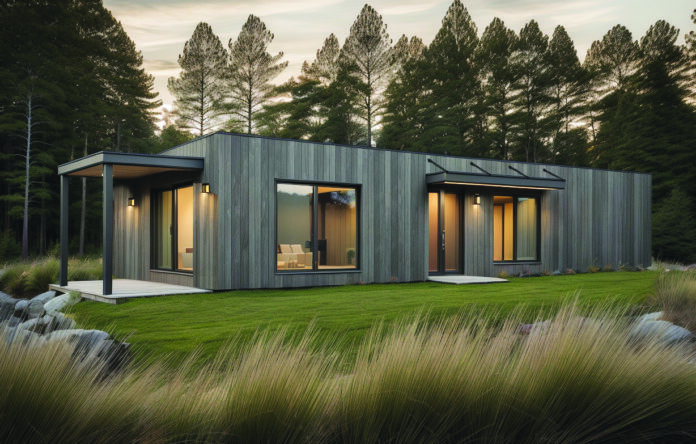Offering predesigned homes can benefit customers on strict timelines, as well as developers who need to get projects up and running quickly.
- Predesigned homes fill a need for individual clients who have strict time constraints, and for developers on tight schedules.
- The key for the manufacturer is to stay up to date on the attributes that a majority of new-home buyers want.
- If few or no changes are permitted, that creates a streamlined production process.

Photo credit: Dvele
Building a custom home is undoubtedly more efficient when using offsite methods, but not every customer has the time or inclination to undertake a custom project, although they still want high quality and a custom look. To serve these customers, some prefab companies are offering a portfolio of predesigned single-family homes that can be delivered quickly.
Modular builder Anthony Zarrilli, CEO of Zarilli Homes in Brick, N.J., has had this option for more than 12 years, with a quick-delivery portfolio that he offers in New Jersey and the Florida Keys. “Most of my clients in New Jersey want something very custom and the fast track doesn’t always work as well,” says Zarrilli. “For my clients in the Florida Keys, it works much better.”
The quick-delivery process is the same as it would be for a custom home, he says: “It just goes much faster and more efficiently than a fully custom home design and finishes.”

Photo credit: Sun Valley Photo
The typical customer for this type of home is either a first-time buyer with a limited budget, or someone with a strict timeline who is interested mostly in bedroom and bath counts.
Customers can make only modest changes to the home. As soon as they start making the house footprint larger or smaller, “it is thrown back into the custom-home line and [that adds] time and cost to the project,” Zarrilli says.
The bottom line for a prefab company looking to start a fast-track program? “Think about the market you are serving and the most common attributes your customers are looking for,” he says, “and incorporate those attributes into the design and finishes of the homes you are going to offer.” He cautions that the designs of these homes need to evolve with market trends. “To be successful, you will have to [continually] adapt to changes from the customer and the industry in general.”
Another company that has recently introduced a line of predesigned homes for budget-conscious customers is Method Homes of Seattle. Although the company built its reputation on upscale one-of-a-kind module-based projects, the design process is significantly streamlined and shorter with the new line, and there are no design fees, says Brian Abramson, Founder and CEO: “I’d say it’s 50 to 75 percent quicker and less expensive than a custom home built from the ground up.”
Abramson says that customers always want to make at least some changes to a predesigned home. “No one has ever taken a model ‘as is,’ but we’re trying to do more standardized work,” he says. “If you can find a way to do less customization, it’s a win. I would highly recommend it. But that would mean creating a line of homes that can adapt to different sites and the needs of different owners.” He says that a good way to do this would be with a kit of parts that can be mixed and matched in different ways.

Photo credit: AMF Photography
Targeting Developers
Other companies, like Volumod of Indianapolis, Ind. are focusing on direct-to-developer sales.
“We just started selling predesigned [modular] homes, and it’s already paying dividends,” says Ryan Scott, President. The modular company is targeting developers and investors, rather than homebuyers, Scott says, because developers do not make changes whereas buyers tend to want to customize.
“If it has the right square footage and the amenities and bedroom/bath counts, by taking this [plan] off the shelf you’re eliminating a large part of the process,” he says. “The design and engineering approval aspect is already done.”
Volumod seeks to build repetitive designs. “We’re targeting multifamily developers in the hospitality, workforce, student housing and other niches with a higher box count and similar designs,” says Scott. “They are less likely to want design changes. Investors, too, are looking for something that has the right amenities for a particular market segment and numbers that work.”
Modular construction appeals to developers in remote areas who do not have a workforce they can tie up for a nine to 18-month multifamily build. That’s why La Jolla, Calif.-based Dvele began offering single-family homes and townhomes to developers in the fall of 2023, with a delivery time of just 16 weeks.
“We have three townhome/duplex floor plans,” says Amy Armstrong, Senior Co-director of Product Design and Development. “We also have two single-family designs, a few ADU options and a plan we are calling our hospitality unit. It’s one bedroom, one bathroom and a wet bar.”

Photo credit: Method Homes
Up to this point, the company has been working primarily with small and medium-size developers to achieve the right scale for their product offerings. “I think the appeal for them is the efficient building process and the fact that it’s repeatable,” she says.
Dvele is currently filtering through the single-family designs it sold last year and determining what modifications to make. More effort will be put into new designs going forward. “We’re looking at what historically has been important [to clients] and deciding what finishes, fixtures, sustainable features, and so on to include.”
In the next two years, says Armstrong, Dvele will “dive into” 100-unit-and-higher development projects. The townhomes are strictly for sale; rental apartments are not yet on the horizon. “We’re giving families an opportunity to own a house, even if there is one shared wall,” she says.
The company has been focusing on the young family demographic. “We offer a wide range of plans,” Armstrong says. “We find, through market research and [collaboration] with developers over these past few months, that we’ve really honed in on what the market is asking for.”

Photo credit: Volumod
On the single-family side, Dvele’s solution is a home that can be adjusted to fit different sized lots. “When the developer does choose a plan, we want to make sure it goes through the factory as efficiently as possible,” says Armstrong. “On our end, that means really minimal changes.”
Developers can make some selections, such as cabinet and flooring colors, “so that not every home is identical on the inside. But everything is predetermined just to make sure we can meet the deadlines [that we said we can meet],” says Vanessa Young, Senior Co-director of Product Design and Development.
Exterior design entails a wide range of factors from massing and cladding to landscaping, windows, doors, roof overhangs and canopies. “Our design team has spent a lot of effort nailing down a look that not only appeals to a wide range of people, but also has a timeless aesthetic,” Young says. “We don’t want anything that’s really dated or speaks to a specific timeframe.”

Photo credit: Volumod
Susan Bady is a freelance writer based in Chicago, Ill., who focuses on residential and commercial design and construction topics including sustainability and building technology.






